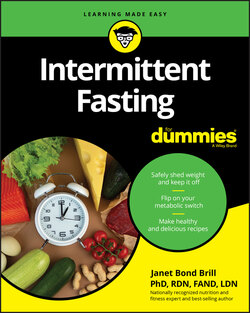Читать книгу Intermittent Fasting For Dummies - Janet Bond Brill - Страница 45
Balancing your equation
ОглавлениеThe energy balance equation illustrates how weight loss and gain relate to calories. In order to maintain your current weight, you need to consume approximately the same number of calories as you burn:
Calories in = Calories out
Conversely, if you want to lose weight, you need to consume fewer calories or burn more calories. For most people, a calorie deficit of 500 calories per day is just enough to promote weight and fat loss and unlikely to significantly affect your muscle mass or energy levels.
In addition to intermittent fasting, you should also increase your physical activity — to widen the calorie deficit. Intermittent fasting creates a calorie deficit through its focus on diet rather than exercise alone, a method that many find easier than attempting to lose weight through just exercise. As a general rule, weight loss is generally 75 percent diet and 25 percent exercise. However, don’t nix the exercise in your intermittent fasting lifestyle because physical activity is also important for promoting better health.
Keep in mind that more muscular bodies need more calories to sustain themselves than less lean bodies. If you wish to gain weight (muscle) and still reap the rewards of intermittent fasting, then calories in should be greater than calories out. You can accomplish this by having a highly nutritious caloric-dense diet combined with a solid strength training program (refer to Chapter 14 for more about incorporating exercise into your lifestyle).
